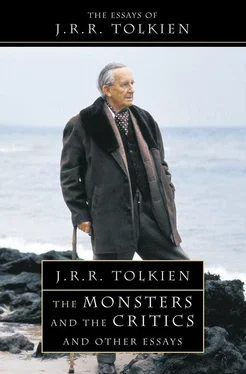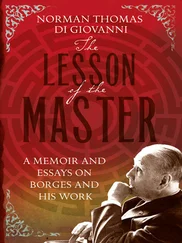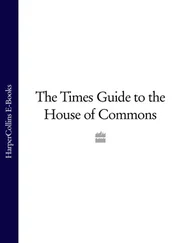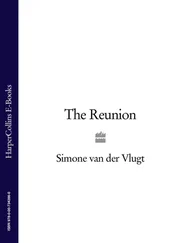1 ...7 8 9 11 12 13 ...17 I will conclude by drawing an imaginary contrast. Let us suppose that our poet had chosen a theme more consonant with ‘our modern judgement’; the life and death of St Oswald. He might then have made a poem, and told first of Heavenfield, when Oswald as a young prince against all hope won a great victory with a remnant of brave men; and then have passed at once to the lamentable defeat of Oswestry, which seemed to destroy the hope of Christian Northumbria; while all the rest of Oswald’s life, and the traditions of the royal house and its feud with that of Deira might be introduced allusively or omitted. To any one but an historian in search of facts and chronology this would have been a fine thing, an heroic-elegiac poem greater than history. It would be much better than a plain narrative, in verse or prose, however steadily advancing. This mere arrangement would at once give it more significance than a straightforward account of one king’s life: the contrast of rising and setting, achievement and death. But even so it would fall far short of Beowulf . Poetically it would be greatly enhanced if the poet had taken violent liberties with history and much enlarged the reign of Oswald, making him old and full of years of care and glory when he went forth heavy with foreboding to face the heathen Penda: the contrast of youth and age would add enormously to the original theme, and give it a more universal meaning. But even so it would still fall short of Beowulf . To match his theme with the rise and fall of poor ‘folk-tale’ Beowulf the poet would have been obliged to turn Cadwallon and Penda into giants and demons. It is just because the main foes in Beowulf are inhuman that the story is larger and more significant than this imaginary poem of a great king’s fall. It glimpses the cosmic and moves with the thought of all men concerning the fate of human life and efforts; it stands amid but above the petty wars of princes, and surpasses the dates and limits of historical periods, however important. At the beginning, and during its process, and most of all at the end, we look down as if from a visionary height upon the house of man in the valley of the world. A light starts – lixte se leoma ofer landa fela – and there is a sound of music; but the outer darkness and its hostile offspring lie ever in wait for the torches to fail and the voices to cease. Grendel is maddened by the sound of harps.
And one last point, which those will feel who to-day preserve the ancient pietas towards the past: Beowulf is not a ‘primitive’ poem; it is a late one, using the materials (then still plentiful) preserved from a day already changing and passing, a time that has now for ever vanished, swallowed in oblivion; using them for a new purpose, with a wider sweep of imagination, if with a less bitter and concentrated force. When new Beowulf was already antiquarian, in a good sense, and it now produces a singular effect. For it is now to us itself ancient; and yet its maker was telling of things already old and weighted with regret, and he expended his art in making keen that touch upon the heart which sorrows have that are both poignant and remote. If the funeral of Beowulf moved once like the echo of an ancient dirge, far-off and hopeless, it is to us as a memory brought over the hills, an echo of an echo. There is not much poetry in the world like this; and though Beowulf may not be among the very greatest poems of our western world and its tradition, it has its own individual character, and peculiar solemnity; it would still have power had it been written in some time or place unknown and without posterity, if it contained no name that could now be recognized or identified by research. Yet it is in fact written in a language that after many centuries has still essential kinship with our own, it was made in this land, and moves in our northern world beneath our northern sky, and for those who are native to that tongue and land, it must ever call with a profound appeal – until the dragon comes.
(a) Grendel’s Titles
The changes which produced (before A.D. 1066) the mediaeval devil are not complete in Beowulf, but in Grendel change and blending are, of course, already apparent. Such things do not admit of clear classifications and distinctions. Doubtless ancient pre-Christian imagination vaguely recognized differences of ‘materiality’ between the solidly physical monsters, conceived as made of the earth and rock (to which the light of the sun might return them), and elves, and ghosts or bogies. Monsters of more or less human shape were naturally liable to development on contact with Christian ideas of sin and spirits of evil. Their parody of human form ( earmsceapen on weres wœstmum ) becomes symbolical, explicitly, of sin, or rather this mythical element, already present implicit and unresolved, is emphasized: this we see already in Beowulf, strengthened by the theory of descent from Cain (and so from Adam), and of the curse of God. So Grendel is not only under this inherited curse, but also himself sinful: manscaða, synscaða, synnum beswenced; he is fyrena hyrde. The same notion (combined with others) appears also when he is called (by the author, not by the characters in the poem) hœþen, 852, 986, and helle hœfton,feond on helle. As an image of man estranged from God he is called not only by all names applicable to ordinary men, as wer, rinc, guma, maga, but he is conceived as having a spirit, other than his body, that will be punished. Thus alegde hœþene sawle: þœr him hel onfeng, 852; while Beowulf himself says ðœr abidan sceal miclan domes, hu him scir Metod scrifan wille, 978.
But this view is blended or confused with another. Because of his ceaseless hostility to men, and hatred of their joy, his super-human size and strength, and his love of the dark, he approaches to a devil , though he is not yet a true devil in purpose. Real devilish qualities (deception and destruction of the soul), other than those which are undeveloped symbols, such as his hideousness and habitation in dark forsaken places, are hardly present. But he and his mother are actually called deofla, 1680; and Grendel is said when fleeing to hiding to make for deofla gedrœg. It should be noted that feond cannot be used in this question: it still means ‘enemy’ in Beowulf, and is for instance applicable to Beowulf and Wiglaf in relation to the dragon. Even feond on helle , 101, is not so clear as it seems (see below); though we may add wergan gastes , 133, an expression for ‘devil’ later extremely common, and actually applied in line 1747 to the Devil and tempter himself. Apart, however, from this expression little can be made of the use of gast, gœst . For one thing it is under grave suspicion in many places (both applied to Grendel and otherwise) of being a corruption of gœst, gest ‘stranger’; compare Grendel’s title cwealmcuma, 792 = wœlgœst , 1331, 1995. In any case it cannot be translated either by the modern ghost or spirit. Creature is probably the nearest we can now get. Where it is genuine it applies to Grendel probably in virtue of his relationship or similarity to bogies ( scinnum ond scuccum ), physical enough in form and power, but vaguely felt as belonging to a different order of being, one allied to the malevolent ‘ghosts’ of the dead. Fire is conceived as a gœst (1123).
This approximation of Grendel to a devil does not mean that there is any confusion as to his habitation. Grendel was a fleshly denizen of this world (until physically slain). On helle and helle (as in helle gast 1274) mean ‘hellish’, and are actually equivalent to the first elements in the compounds deaþscua, sceadugengea, helruna . (Thus the original genitive helle developed into the Middle English adjective helle, hellene ‘hellish’, applicable to ordinary men, such as usurers; and even feond on helle could be so used. Wyclif applies fend on helle to the friar walking in England as Grendel in Denmark.) But the symbolism of darkness is so fundamental that it is vain to look for any distinction between the þystru outside Hrothgar’s hall in which Grendel lurked, and the shadow of Death, or of hell after (or in) Death.
Читать дальше












